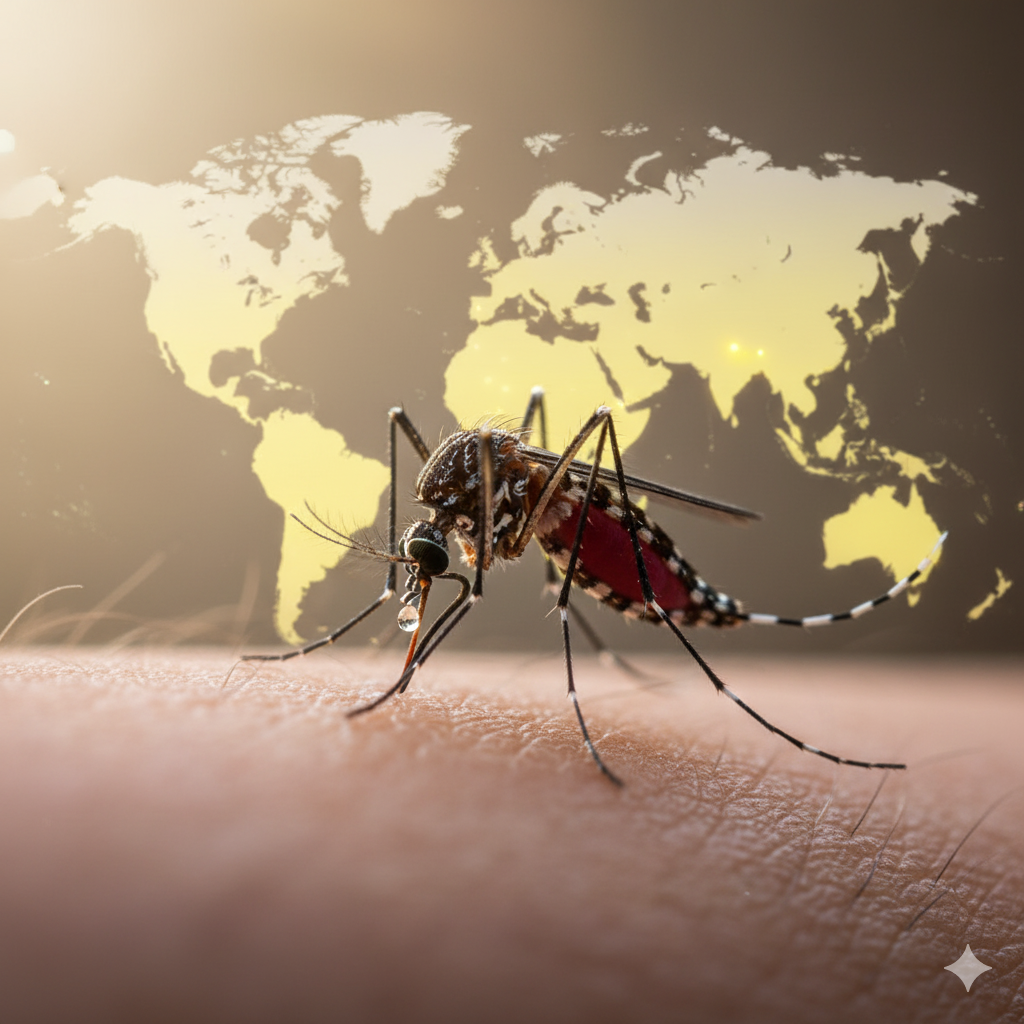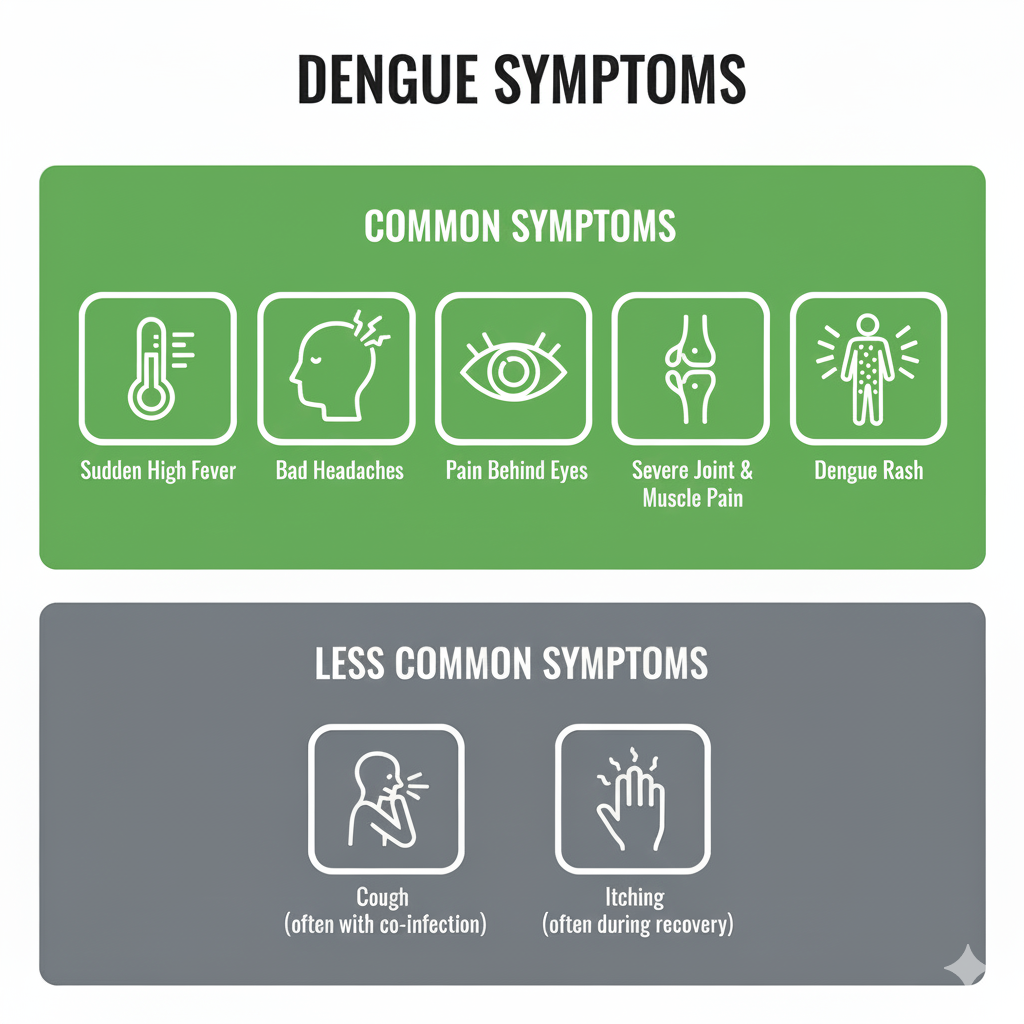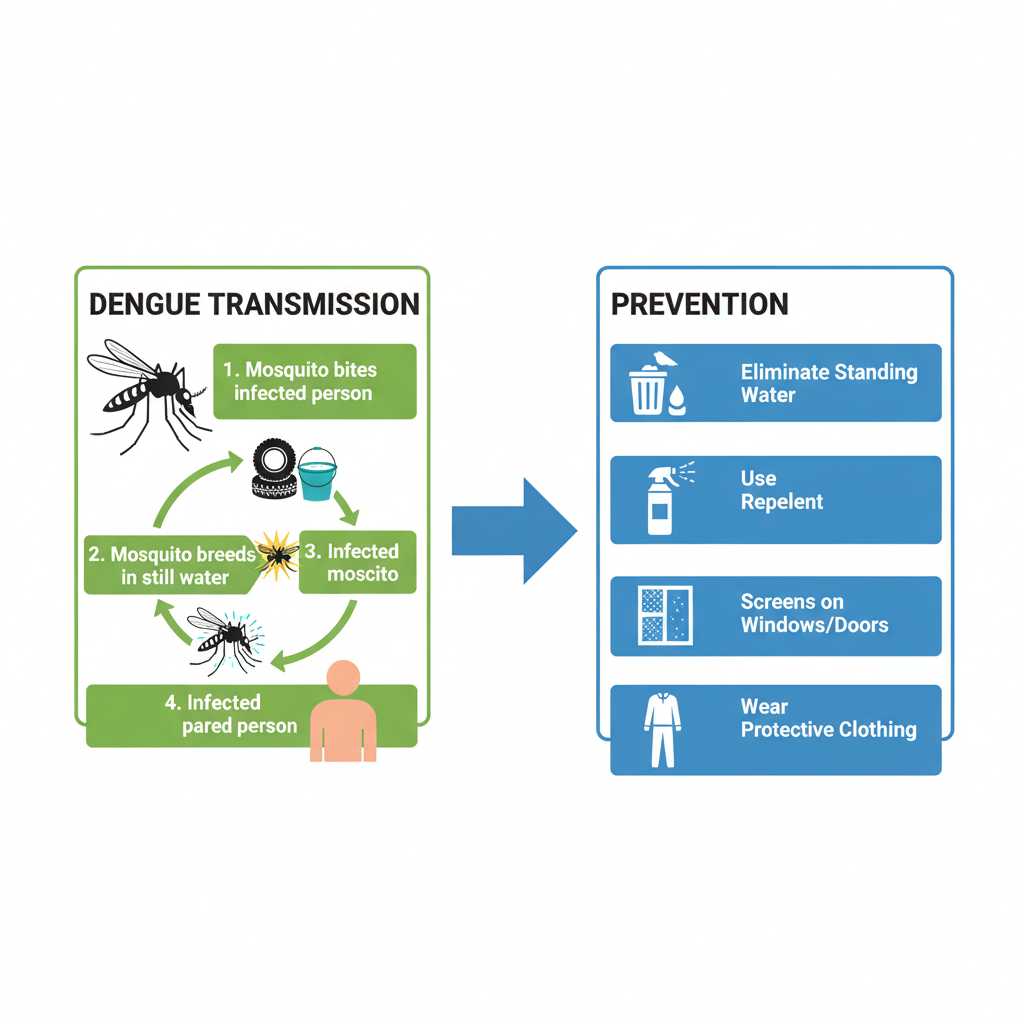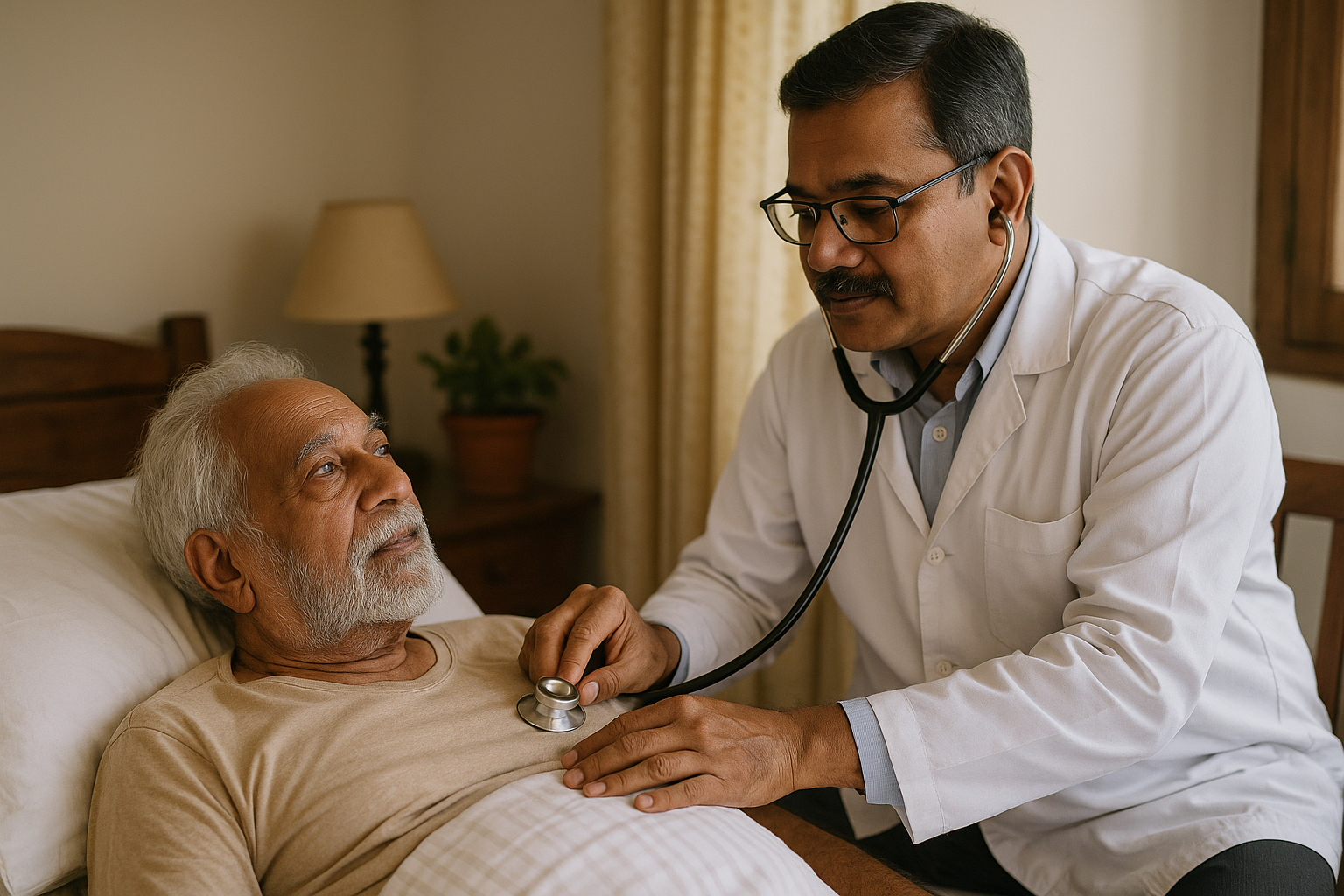Dengue fever comes from mosquito bites. The Aedes mosquito carries the dengue virus. Symptoms show up four to ten days after a bite. This disease starts suddenly and can get serious fast.About half the world's people face dengue risk. Tropical and hot areas see the most cases. The World Health Organization tracks this disease closely.

Dengue causes many different symptoms. Some people get mild fever. Others face serious problems like bleeding or shock. This makes dengue hard to predict and treat.
How is Dengue Transmitted?
Female Aedes aegypti mosquitoes spread dengue. These bugs love city areas. They lay eggs in still water. Old tires, buckets, and open tanks make perfect homes for them.
When a mosquito bites someone with dengue, it gets infected. Then it can give the virus to other people through more bites. This is how dengue spreads from person to person.
Knowing how these mosquitoes live helps us fight them. Getting rid of places where they breed works well. Using bug spray also keeps them away.
Global Impact of Mosquito-Borne Illnesses
Mosquito diseases hurt people worldwide. Dengue infects about 390 million people each year. Southeast Asia, Latin America, and Pacific Islands see the most cases.
These diseases cost a lot of money. They also cause social problems. Climate change makes things worse. Cities growing bigger also helps mosquitoes spread.
Finding dengue early can save lives. Teaching people about prevention helps too. Home healthcare services play a big role in fighting this disease.
Common Symptoms of Dengue Fever
Recognizing the Early Signs of Dengue
Early dengue looks like the flu. This makes it hard to spot. The first signs include:
- Sudden high fever
- Bad headaches
- Pain behind the eyes
- Joint and muscle pain
Doctors call the muscle pain "breakbone fever" because it hurts so much. Getting medical help early stops dengue from getting worse.

Acute Symptoms: Fever, Headache, and Muscle Pain
The virus causes very high fever. It can reach 104°F (40°C). Strong headaches come with the fever. Muscle and joint pain can be terrible.
Some people also feel sick to their stomach. They might throw up. How bad these symptoms get depends on each person. People who had dengue before might have different reactions.
Understanding the Rash Associated with Dengue
Dengue causes a special rash. It often appears after the fever goes down. The rash looks like small red spots all over the body.
It usually starts on the face first. Then it spreads to arms, legs, and chest. This rash helps doctors know it's dengue and not another disease.
Is Cough a Symptom of Dengue?
Analyzing Respiratory Symptoms in Dengue
Cough isn't a normal dengue symptom. The virus doesn't usually attack the lungs. But some people do get coughs with dengue.
This might happen if they get another infection at the same time. People with breathing problems might cough more when they have fever. Watching for other dengue signs helps tell the difference.
%20(1).png)
Differentiating Between Common Cold and Dengue Events
Colds and dengue can seem similar. Colds cause cough, sore throat, and stuffy nose. Classic dengue doesn't have these symptoms.
But sometimes dengue shows up in strange ways. This happens more in places where both diseases are common. Looking for fever patterns, rashes, and muscle pain helps doctors figure out what's wrong.
Case Studies: Incidence of Cough in Dengue Patients
Research shows some dengue patients do get coughs. This often happens when they have other infections too. A study from Southeast Asia found patients with cough who tested positive for dengue.
Doctors should think about dengue in anyone with fever and rash. This is especially true in areas where dengue is common. Home doctor visits can help with quick diagnosis and treatment.
Exploring Less Common Symptoms: Itching and Sore Throat
Is Itching a Symptom of Dengue? What Research Says
Itching isn't common with dengue fever. But it can happen, especially when people start getting better. The itching often comes with the rash as it heals.
Research shows itching might be more common in some groups of people. It might depend on how their body fights the virus. This isn't the same as itching from other bug bites or allergies.
Doctors sometimes hear patients complain about itching. While it doesn't prove someone has dengue, it can be part of the bigger picture along with fever and rash.
Investigating the Sore Throat Phenomenon in Dengue
Sore throat isn't a standard dengue symptom. When it happens, it's usually because of another infection at the same time. The dengue virus itself doesn't cause sore throats.
Doctors need to look at sore throat along with other symptoms like joint pain and throwing up. Medical books do mention some unusual dengue cases that include sore throat.
This shows why doctors need to watch for different symptom combinations. This is extra important in places where dengue and flu might spread at the same time.
Review of Medical Literature on Atypical Dengue Symptoms
Medical research shows that typical symptoms like fever and rash are well known. But unusual symptoms like itching and sore throat aren't understood as well.
Studies suggest these symptoms might come from how the body's defense system reacts to dengue. They might also happen because of other health problems at the same time.
Doctors should ask detailed questions and do complete exams. This helps them figure out if unusual symptoms are part of dengue. Getting the right diagnosis means getting the right treatment.
How Symptoms of Dengue Differ from Other Illnesses
Dengue vs Influenza: Symptom Comparison
Dengue and flu share some symptoms. Both cause fever and muscle aches. But flu usually has more breathing problems like lasting cough, sore throat, and stuffy nose.
Dengue is known for terrible joint and muscle pain. People call it "breakbone fever." Dengue also causes a special rash that flu doesn't have.
Charts that compare the two diseases help patients and doctors tell them apart. This leads to better diagnosis and treatment.
Understanding Fever Patterns: Dengue vs Malaria
Both dengue and malaria cause fever. But the fever patterns are different. Dengue fever stays high and doesn't change as much as malaria fever.
Malaria often has fevers that come and go with chills and sweats. Dengue has a rash that malaria doesn't have.
Knowing these differences helps in places where people might get both diseases. Doctors need special tests to be sure which disease someone has.
Diagnostic Challenges: Recognizing Dengue in Mixed Infections
Finding dengue gets hard when people have more than one disease. Symptoms can overlap with chikungunya or Zika. All three are spread by mosquitoes.
All three can cause rashes and fever. This makes it confusing for doctors. Labs need to do special tests like PCR and blood tests to tell the diseases apart.
Getting the right diagnosis early is important. Each disease needs different treatment. Doctors must be suspicious of dengue and use several tests to be sure.
Prevention and Early Detection of Dengue Symptoms
Strategies for Mosquito Control and Bite Prevention
Stopping dengue starts with controlling mosquitoes and avoiding bites. Good ways to do this include:
- Getting rid of standing water where mosquitoes lay eggs
- Using bug spray with DEET on skin and clothes

- Putting screens on windows and doors
- Wearing long sleeves and pants
Community programs help teach people these prevention methods. Health organizations play a big role in spreading this knowledge.
Recognizing Alarms: When to Seek Medical Attention
Knowing when to get medical help for dengue is very important. Get help right away if you have high fever, bad stomach pain, throwing up a lot, bleeding gums, or feel very tired.
Watch out for warning signs between the third and seventh day of being sick. This is when serious problems are most likely to happen.
Teaching materials help communities spot these signs early. Quick medical help can save lives.
Role of Community Awareness in Early Detection
Community knowledge is key to finding dengue early and stopping its spread. Teaching people about symptoms, prevention, and when to see doctors makes a big difference.
Community events and workshops give people places to learn and work together. Health-focused organizations provide platforms for education and action.
When communities work together on early detection, they handle dengue outbreaks better. This group effort makes everyone healthier and better able to fight mosquito diseases.
Treatment and Management of Dengue Fever
Current Medical Treatments for Dengue Symptoms
Dengue treatment focuses on managing symptoms. There's no specific medicine that kills the virus. Key treatments include:
- Drinking lots of fluids to prevent dehydration
- Watching for problems and treating symptoms
- Taking acetaminophen for fever and pain (avoid ibuprofen and aspirin because they can cause bleeding)
Hospitals give IV fluids and minerals to serious cases. This helps stabilize patients, especially those with bleeding or shock from dengue.
.png)
Home Remedies: Managing Symptoms Effectively
Along with medical treatment, some home remedies can help manage symptoms. Staying hydrated is most important. Coconut water, clear soups, and rehydration drinks work well.
Resting in a comfortable, mosquito-free place reduces risk of more bites. Using cool cloths on the forehead helps with fever discomfort.
Always talk to a healthcare professional first. Home doctor services can make sure these remedies are safe and won't interfere with medical treatments.
Addressing Severe Cases: When Hospitalization is Needed
Hospitals are needed for severe dengue cases. Signs include bad stomach pain or a lot of bleeding. Professional medical care prevents life-threatening problems like shock or organ failure.
Hospitals can provide complete care. They monitor patients, manage fluids, and give necessary treatments.
Good management of severe dengue saves lives. This shows why getting medical help quickly is so important. Public awareness about when to seek professional healthcare in complex cases is crucial.
Conclusion
Learning about dengue symptoms shows how complex this mosquito disease is. The classic signs include high fever, bad headache, and severe muscle pain. But our research shows other unusual signs can sometimes happen too.
Cough and itching aren't main dengue symptoms. But they can sometimes appear in dengue cases. Itching might come with the dengue rash. Cough might happen because of other infections at the same time, not from the virus itself.
Getting dengue right requires knowing its symptoms, how it spreads, and its global impact. Climate change and growing cities help dengue spread. Communities need to take prevention steps and watch for early symptoms.
DrMorepenHome.com works to spread awareness and teach people about health issues like dengue. We provide valuable information about symptoms and management strategies. Our goal is to give people the knowledge they need to face this serious health challenge.
Staying informed and taking action can greatly reduce dengue's impact. This ensures healthier communities everywhere.
FAQs
Can dengue be prevented, and is there a vaccine available?
Yes, you can prevent dengue by avoiding mosquito bites. Get rid of breeding sites, use mosquito repellent, and wear protective clothes. A dengue vaccine exists but doctors only recommend it for people who had dengue before. The vaccine can have complex reactions with the immune system. Always ask healthcare professionals for personal advice on prevention and vaccines.
What should I do if my symptoms worsen while having dengue?
If symptoms get worse, especially bad stomach pain, bleeding, or throwing up a lot, get medical help right away. These could be signs of severe dengue that needs urgent care to prevent serious problems. Keep watching your symptoms and stay hydrated during recovery. Talk to your healthcare provider regularly.
How can I support someone recovering from dengue fever?
Help someone with dengue by making sure they rest, drink fluids, and eat well. Encourage them to follow medical advice and go to follow-up appointments to check their recovery. Watch for any new or worse symptoms. Give them a calm and comfortable place to help them heal.
Are there home remedies for managing dengue symptoms effectively?
Rest, fluids, and over-the-counter pain relievers can help with symptoms. But be careful with home remedies. Keep talking with healthcare providers to make sure these approaches work and don't interfere with professional medical advice.
How can community awareness contribute to early detection of dengue?
Community awareness plays a big role in controlling dengue outbreaks. Teaching people about symptoms, how it spreads, and prevention helps them seek health care quickly. When communities share accurate information, they can work together to reduce dengue's impact. This ensures timely medical help and stops the disease from spreading.
.png)



.png)
.png)
.png)
.png)
.png)
.png)
.png)

.png)
.png)
.png)

.png)
.png)
.png)
.png)
.png)
.png)

.png)
.png)

.png)
.png)
.png)

.png)

.png)


.png)







